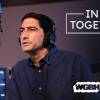The Greater Boston Food Bank is marking its 40th anniversary this month with a major milestone — the organization has now distributed 1 billion pounds of food to residents in eastern Massachusetts who are struggling with food insecurity.
Juan Encarnacion has been delivering food from the Greater Boston Food Bank's Boston warehouse to pantries and distribution centers throughout the region for 30 years.
More Local News
He says he can't imagine working anywhere else. "It's the people at the food bank that make my job meaningful. I come in with a smile every day because I know the way they treat me and the way they work around me, and the people are committed, which I like very much, which is a joy," he told GBH News. Encarnacion both delivers food and brings back donated and purchased food to the warehouse where it is unloaded and sorted for future deliveries.
Cheryl Schondek is executive vice president of food acquisition, supply chain and volunteers at the Greater Boston Food Bank. She said their food supply is not simply dry goods. "Sixty percent of the food that Juan delivers is produce, protein or dairy. So when I say protein, it's beans, it's tofu, it's pork, it's beef, it's poultry. We're very proud of that."
Schondek says the Greater Boston Food Bank also works with local farmers through the state-funded Massachusetts Emergency Food Assistance Program (MEFAP) to procure ethnically diverse foods.
Schondek says Juan is indispensable. "I need to clone Juan and all of his colleagues because of the exceptional work they do every day." She said there is fierce competition for commercial truck drivers right now because they are needed to transport the coronavirus vaccine to the various vaccine distribution sites.
Encarnacion, who was born in Puerto Rico, said food insecurity is personal for him. "I come from a family that was very poor," he says, his voice trailing off.
He lived in foster care until he moved to New York City at the age of 11, and now, 50 years later, he finds that delivering food to people who otherwise wouldn't have it is especially meaningful. "Their eyes, their action, their emotions, everything, when you bring the food to them, there is a little bit of happiness," he said.








